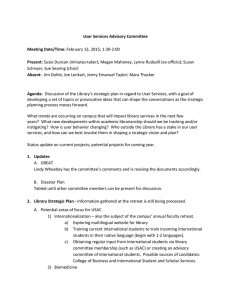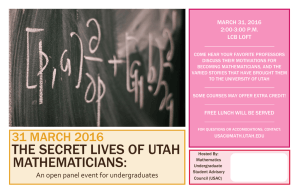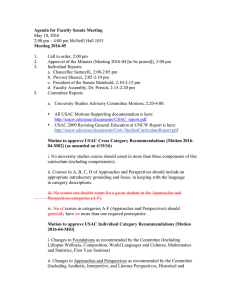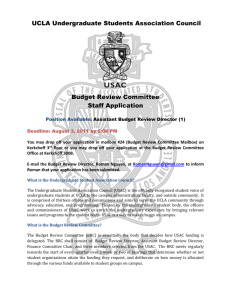Document 12007427
advertisement
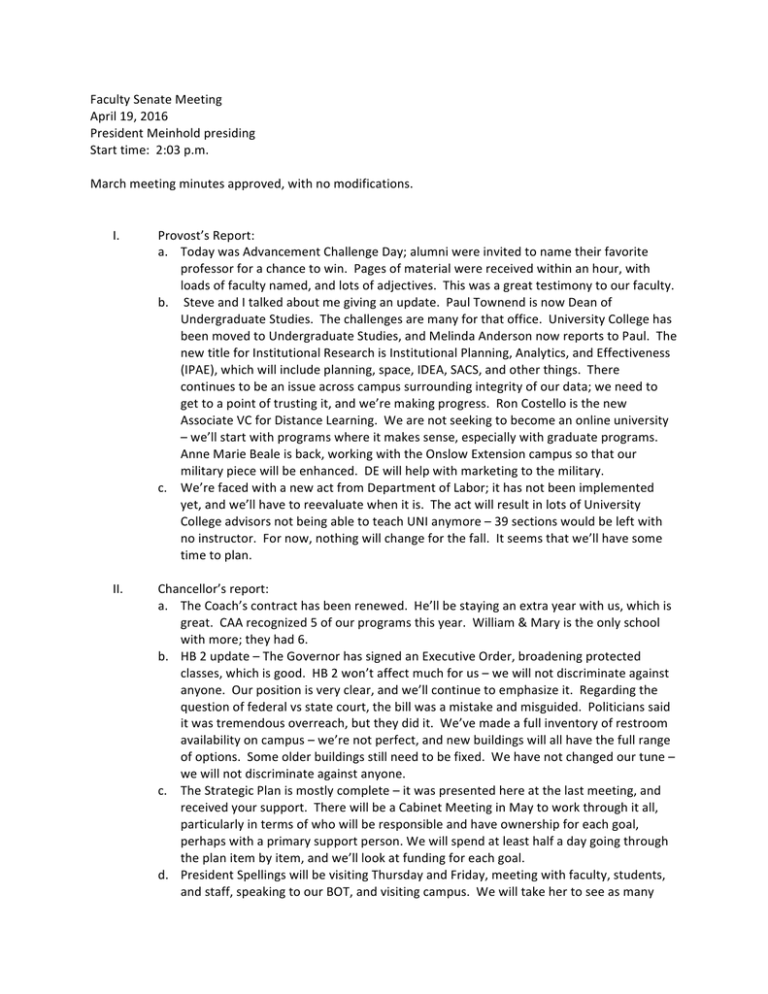
Faculty Senate Meeting April 19, 2016 President Meinhold presiding Start time: 2:03 p.m. March meeting minutes approved, with no modifications. I. II. Provost’s Report: a. Today was Advancement Challenge Day; alumni were invited to name their favorite professor for a chance to win. Pages of material were received within an hour, with loads of faculty named, and lots of adjectives. This was a great testimony to our faculty. b. Steve and I talked about me giving an update. Paul Townend is now Dean of Undergraduate Studies. The challenges are many for that office. University College has been moved to Undergraduate Studies, and Melinda Anderson now reports to Paul. The new title for Institutional Research is Institutional Planning, Analytics, and Effectiveness (IPAE), which will include planning, space, IDEA, SACS, and other things. There continues to be an issue across campus surrounding integrity of our data; we need to get to a point of trusting it, and we’re making progress. Ron Costello is the new Associate VC for Distance Learning. We are not seeking to become an online university – we’ll start with programs where it makes sense, especially with graduate programs. Anne Marie Beale is back, working with the Onslow Extension campus so that our military piece will be enhanced. DE will help with marketing to the military. c. We’re faced with a new act from Department of Labor; it has not been implemented yet, and we’ll have to reevaluate when it is. The act will result in lots of University College advisors not being able to teach UNI anymore – 39 sections would be left with no instructor. For now, nothing will change for the fall. It seems that we’ll have some time to plan. Chancellor’s report: a. The Coach’s contract has been renewed. He’ll be staying an extra year with us, which is great. CAA recognized 5 of our programs this year. William & Mary is the only school with more; they had 6. b. HB 2 update – The Governor has signed an Executive Order, broadening protected classes, which is good. HB 2 won’t affect much for us – we will not discriminate against anyone. Our position is very clear, and we’ll continue to emphasize it. Regarding the question of federal vs state court, the bill was a mistake and misguided. Politicians said it was tremendous overreach, but they did it. We’ve made a full inventory of restroom availability on campus – we’re not perfect, and new buildings will all have the full range of options. Some older buildings still need to be fixed. We have not changed our tune – we will not discriminate against anyone. c. The Strategic Plan is mostly complete – it was presented here at the last meeting, and received your support. There will be a Cabinet Meeting in May to work through it all, particularly in terms of who will be responsible and have ownership for each goal, perhaps with a primary support person. We will spend at least half a day going through the plan item by item, and we’ll look at funding for each goal. d. President Spellings will be visiting Thursday and Friday, meeting with faculty, students, and staff, speaking to our BOT, and visiting campus. We will take her to see as many III. places as possible. She will be speaking to the Chamber of Commerce in the early afternoon and then go back to Chapel Hill. e. Our incoming class is almost complete – our freshmen yield is about 21% ahead of where we were at this time year, and the incoming transfer class is about 20% ahead. Basketball success seems to help. Everything is looking good for now; we’re making especially good progress with Hispanic students. Michael Wilhelm has been working hard on international recruiting. Ron Costello is here now to help thinking about on-­‐line education. Bill Kasinski’s new assignment is to work with our military at Camp Lejuene. f. We’re also working hard to get going on the new Allied Health Building – many want to be in the new building. The deans will work together with Charlie Hardy and the Provost to make sure it all gets done. g. Question from the floor: Can we accommodate the increase in number of transfers and freshmen? Response: The number hasn’t changed a lot – we’re expecting about the same number of freshmen. We are thinking about dorms that need fixing (Galloway, Hewitt, and Belk). Starting this fall all freshmen will have to live on campus, so upper classmen may have to move out for fall. We’re planning for new residences. Parking is a critical issue, given our planning for the next 10-­‐15 years. We’ll need new options ; a team is focused on this as part of the master plan. President’s report: a. BOG and UNC GA have signed off on our Policies on Academic Freedom & Tenure. All changes will be integrated into our Handbook and ready for fall. Electronic dossiers will be required for fall (no more paper copies starting fall, 2016). I will be presenting to BOT on Thursday on University Studies. Faculty will have time with President Spellings on Friday. We’ll highlight what’s unique about UNCW, faculty welfare on our campus and statewide (e.g., salary, benefits, health care), and statewide faculty assembly items (e.g., support of historically black colleges and our anti-­‐NC Gap position). b. Jeanie Persuit presented the Faculty Assembly report: The last FA meeting of the year was held Apr 8 (5 meetings/year). Highlights: congratulatons to Gabriel who will next year’s FA Chair, and to Candace Thompson who will be a delegate to the four delegate caucus. Gene Nichol presented on purposes of higher education, the import of true higher education, NC’s unique relation to higher ed, and how our work is very important (vs moving to a private model, as in other states). What we do matters, and we need to stay committed and active. Four resolutions were passed: we endorsed the work of the General Education Council and their specific recommendations; supported UNC Staff Assembly salary actions, and resolved to encourage a look at faculty salaries as well; supported the current policy on diversity, inclusion, and nondiscrimination as per the UNC Code (as opposed to HB 2); and resolved to recognize analysis of findings of the potential impact of NC Gap (a significant piece of legislation that is more concerning the more we learn about it). A major concern about NC Gap is that its negative impacts would primarily hit poorer rural areas. Steve Leonard notes that faculty need to learn about NC Gap and discuss it – it is the most significant legislative on higher education in 40 years. c. Congratulations to Chair Lugo. IV. Committee reports: a. Steering Committee Motion – Resolution on Affirming the UNC’s Current Nondiscrimination Policy and Calling for the Repeal of N.C. Sess. Laws 2016-­‐3 [Motion 2016-­‐04-­‐MO1] i. An endorsement for the motion was received from the Biology Department – the first time such endorsement this year. ii. John Sheerer, UNCW General Council, reported that the 4th Circuit Court of Appeals has overturned the Grimm case in VA, regarding access to bathrooms for a transgender young man and the Board of Education’s rule that there be separate bathrooms. The complete implications are not yet clear. iii. The question was called, and the motion carried. b. University Studies Advisory Committee – The USAC has had a pause year of reflection, several members of the committee are here, and ready to answer questions. Thanks to the committee for their work, which was done at our request. Their report is a careful compilation of data and input from multiple sources. The report is now available for all to study, and is before this body for debate. Motions have been constructed together with Paul Townend in order that they can be considered sequentially. The committee will listen to our debate, and we will engage them as needed. i. Motion to approve USAC Cross Category Recommendations [Motion 2016-­‐04-­‐ M02] i. No university studies course should count in more than three components of this curriculum (including competencies). ii. Courses in A, B, C, D of Approaches and Perspectives should include an appropriate introductory grounding and focus, in keeping with the language in category descriptions. iii. No course can double-­‐count for a given student in the Approaches and Perspectives categories (A-­‐F). iv. No courses in categories A-­‐F (Approaches and Perspectives) should have more than one required prerequisite. ii. Summary of major issues raised from the floor (like issues collated), and Committee responses: 1. Regarding prerequisites: What if there is a string of prerequisites – how is one prereq defined? Response: The general rule is that there shouldn’t be more than one pre-­‐req, but there are special cases. The recommendation is meant to be a strong guideline, but wouldn’t prevent an individual course from being considered if a strong rationale is provided. Courses will have to be considered individually, and the USAC will make a recommendation. We should end up without too many special cases. After speaking with many groups, there was a general sense that we should move in this direction. We got a lot of push-­‐back on this issue (more than any other issue). This recommendation is the result of discussion and compromise. 2. The language in your response is not what’s reflected in the motion, which says categorically that there will be no more than one. “Generally” would be preferred to the current categorical langue. 3. Motion – The wording for item #iv should be amended to read: “Courses in categories A-­‐F (approaches & perspectives) should generally have no more than one pre-­‐requisite”. The motion was seconded. After another few questions, the question was called, and the motion passed to amend item #4. 4. We could use more time to digest this report – there is a lot to digest, with many implications for our programs and our students’ progress to graduation. Response: We have a large assembly of Senators today so this is an important opportunity to at least have some debate and answer some questions. 5. What is the rationale for item iii? Response: This rule makes advising more difficult. Changing it would not affect many courses or programs, and it would streamline advising. The Registrar’s data show that courses that double count are extremely popular, which many feel is not an ideal situation – students are choosing courses for the wrong reasons. Only rule change would hold only for Approaches & Perspectives. Another issue that came up in the review process was that some courses seemed a stronger fit for one of their categories than another – some courses were trying to do too much. The USAC worried about both of those things. 6. Our major has a huge number of required credits. Students are routinely advised to take courses that count twice, especially our transfer students, who often hit the surcharge. Many faculty reported on the survey that cutting out double-­‐counts would not be helpful, so the input was not taken. Response: Competency courses can still double count – just not A&P. The USAC considered many sources of data and feedback – not just the survey. 7. For item #i (courses should not count in more than 3 components), would the course not be approved for more than 3, or just not count. Why would it not be allowed if the course satisfies all objectives? Response: It would not be approved. The USAC looked at how many courses would be affected -­‐ very few count for 4 components. We were asked to look at whether courses are in too many categories to deliver all learning outcomes. There has been ongoing concern about the number of learning objectives that can be delivered by a single course. There is lots of room for people to feed differently on this. 8. Further comment from the floor: Think about what we were told when IDEA came in – that we should choose only two or three items for our course evaluations, because that’s all we can do realistically. It’s unrealistic to think that a single course can deliver 16-­‐18 outcomes. 9. The impact of the no double-­‐counting rules is understated; not allowing this will further restrict options and create more problems, and will have an impact on transfer students and professional students. Response: It’s a potential 3-­‐hr difference for some students. Only three 10. 11. 12. 13. hours is at stake here. While some students may lose 3 hour, the reforms as a whole give some hours back (e.g., not having to do a cluster, merger of QLR and capstone). Would any Senators like to speak in favor of item #iii? Response from the floor: This is our only avenue for breadth in the curriculum. This is a balanced solution. Items iii and iv in combination make for more hours. Students who have a heavy list of requirements must complete lots of courses early to make room for their later requirements. Taking these options away will make it difficult to meet demands, and will remove already limited flexibility. The three hours make a difference. The recommendations don’t take into account the needs of the professional schools where programs require many hours, and timely graduation is increasingly emphasized. Our accrediting bodies are very strict about what has to be provided. Students end up with the surcharge. International students would also be affected. Was the committee composed of members who could explain these conflicts? VA students also have pressures on how much time they can be in school, and three credits can make a big difference. Response: The USAC looked at graduation data, which show that students are not taking more hours to complete their degrees, even though advisors have questions. There has not been a climb in the hours earned by the point of graduation. We’ll have to continue to keep track, and if the curriculum was making graduation difficult this would be a major concern, but we aren’t seeing that. The USAC has members from the professional schools, and there were lots of meetings with faculty from outside CAS. Everyone had to make decisions about what our General Education program should do. There are concerns about the deficits that our students come in with – it’s a balancing act and General Education has to get that right. We did try to reduce hours overall, but this is the place that might add some hours for some students. This is part of getting us to a place where we can address student need. President Meinhold – this debate is great. Control over the curriculum is one of our most important roles as faculty. We have always had a set of Gen Ed requirements. We felt our new set had gotten away from us a little, and we asked this committee to take a look and make recommendations. There are sign-­‐up sheets here for folks who want to be involved in these committees. Provost – I’ve been trying to hold my tongue. The thing that was hardest for me coming onto this campus was University Studies. Our conversation is down here in the details, without discussion of the bigger picture issues for University Studies. I think it’s essential that we wait until May – I’ve received questions about the language requirement, the capstone, the overall size – how do we keep the conceptual pieces, but make it more comprehensible. We’ve received lots of feedback on how difficult it was to find a particular course. I’m willing to spend time but not sure how I can help. Response: We spent a lot of time to put in place what we have now. We didn’t ask the USAC 14. 15. 16. 17. 18. 19. 20. 21. to go back and rewrite University Studies. We don’t want to put another five years into considering the whole thing, and that’s not what the committee was asked to do. Lots of advisors say they have no problems at all, and there is no evidence that University Studies is slowing down graduation. President Meinhold – What do we want to do. Is there a motion to table MO2 until May. Motion to table was made and seconded. What will be different a month from now? Will we be privy to new information? We are suffering from tensions that are in some ways externally applied – the surcharge – based on faulty assumptions. No further discussion is allowed on this motion. The question was called on the motion to table. A voice vote was divided. By show of hands, only 21 were in favor to table; the motion to table failed. Motion to delete item #iii from MO2. A voice vote was divided. By show of hands, there were 35 votes in favor of striking the item. The motion to amend carried and item #iii was removed. Discussion of the Amended Motion MO2: What does “generally” mean in item #iv? Would all courses that have more than one prerequisite have to resubmit for consideration? Can we clarify whether it’s a string of prerequisites or single prereq? Response: Yes -­‐ you would have to submit a syllabus and explain why the exception is warranted and committee would decide. Nothing would change for the next catalogue year. Changes would start in 2017/18 at the earliest. The recommendation is about a single course, not a string, which would not be one. If this discussion is the minutia, what is higher than this? Response: Everyone received the report on recommendations for our current University Studies program. “Higher than this” would be rethinking University Studies. The charge was only to review the existing curriculum. The USAC asked itself if the program was something that needs to be blown up. Our answer was no -­‐ no one advocated for starting all over again. Communication Studies has been working for years to get oral competency considered for inclusion as part of curriculum. There are a number of models out there, and we will be proposing a motion for the USAC to speak with our department about viable options. We would like to see such a competency. What about reconsideration of courses counting in more than one category? Are the courses in three or more categories inclusive of competencies? Response: To the latter question, yes. Fewer than 5 courses are in 4 categories. We decided that didn’t pass the accountability test, and settled on a maximum of three categories. There aren’t many courses in three categories either, although lots are in two. The equilibrium decided on by the faculty is 2-­‐3. Motion to add “Not Including Competencies” to item #i. This would mean that the total number of categories could be more than three. The motion was seconded. Discussion: It is difficult to see how a single course could accomplish nine or more learning outcomes in a 17 week period. No course addresses that many in a competent way. Response from the floor: The outcomes for critical reasoning are mapped to other outcomes at a higher level. A similar argument applies for the competencies. The question was called on the amendment to insert NOT in #1 (as in “not including competencies”). By voice vote, the amendment to item #iv does not pass. 22. Back to amended MO2: Regarding item #i, if we were to add an oral competency, would this mean that the same course could not satisfy oral, written, and other competencies? This could limit further developments. Response: We’d need to cross that bridge if another category was added. This recommendation is something the USAC felt strongly about. We wanted to encourage an instructor to decide what a course is designed to do. We’d have to revisit if we added a new competency. 23. Are we prepared to vote? I was asked to remind all that you must be an elected or proxy Senator to vote, so that your name is added to the roster. Objections were voiced to a vote now. Motion to delete item #iv from the motion. “Generally” is too general to have a feel for what’s involved. The motion was seconded. After brief debate on the amendment, the question was called. A voice vote was divided. By show of hands, only 17 votes were in favor of the amendment to delete item #iv. The item iv amendment does not pass. 24. Motion to divide the MO 2 and vote on each item individually. The motion was seconded, with no debate. A voice vote on dividing was divided. By show of hands 26 were in favor, with 24 against the motion. The motion to divide passed, and the vote will be conducted serially. 25. Chancellor – This is a little like a Frankenstein motion now. Move to table (a nondebatable motion). A voice vote was divided. By show of hands, there were 29 yeas, 20 nos. The motion to table passed. c. IT and Library Committee – report by Jimmy Reeves: i. The main point is that we need to pay attention. We should tell our colleagues that serious things are coming down the pike. ii. ADA compliance is a major issue. All distance courses must be ADA compliant – there can be no debate on this. Faculty must get help from IT for close-­‐ captioning, etc. iii. There will be a change in our learning management system – it may be Blackboard, but the current version will not accommodate our needs. Canvas is another system that is being considered – it is used by a number of other schools. We will make sure that faculty from all colleges are on that committee. iv. An IT Advisory committee will also be bringing in more faculty involvement. There are lots of IT intiatives (append Jimmy’s slides). We should all have Adobe Acrobat, which is free for all faculty. Windows 10 is coming. Office 2016 is also coming – likely to be very different than the last product. Both will be pushed out next year starting in the fall. Team Dynamics will be the new way to communicate with IT (on tickets, project requests, etc). Let IT know if you have a project on the horizon that involves IT. Please complain or IT won’t know what the problems are. Clutter is another product in Outlook – it is arbitrarily pulling email. It can be shut off. Please look at it if you haven’t. Campus wireless is being updated with more access points. TurningPoint is improving as an alternative to clickers. v. Please communicate with IT. Announcements: We will have a May meeting. Meeting adjourned 4:06 p.m.
